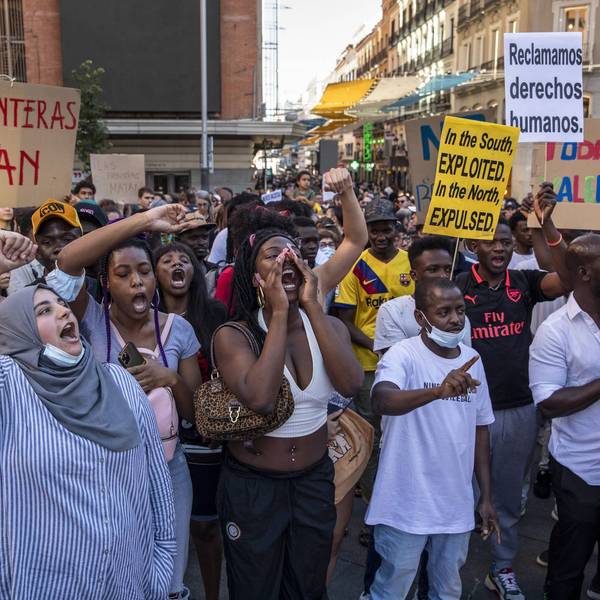June is National Immigration Month in the United States—an appropriate time to reflect on the special role immigrants have played and continue to play in enriching this country.
Far from being a threat to the vitality of America, immigration has been a life-giving force that in every generation has helped the country grow. This fact is on display in communities across the United States as new immigrants and refugees come not only with their hopes and dreams for a better life, but also with their energy and determination to prosper and provide for their families. They also have brought their unique cultural characteristics that contribute to making America the country it is today.
All of this is too often forgotten in times of economic stress or political polarization, as xenophobic bigots rise up demanding that America’s doors be closed. Immigrants are presented as a threat to the economic well-being of citizens. They argue that there is an “American culture” that the immigrants do not share. They raise slogans like “you will not replace us” or “immigrants don’t share our values or culture” or they’ll “pollute the blood of the country.”
Not only will they become American, but also America itself will be transformed by them and their contributions.
What these anti-immigrant bigots forget is that their own ancestors were often greeted by the same fears and exclusionary slogans when they first came to America. And they forget that that there is no uniquely American culture without the contributions of immigrants who made our culture what it is today. What would American culture be without the Scots-Irish and African Americans who brought their music and dance, or the Italians, Chinese, Mexicans, Greeks, and Arabs who contributed their food, or the Eastern European Jewry who gave us their arts and humor, not to speak of the countless others whose contributions to science, medicine, art, and business have made us the country we are today.
It’s important to understand that these two competing visions of the country have come in successive waves. And it’s particularly sad to see the descendants of the earlier waves of immigrants who were reviled a century ago, now becoming the xenophobes of this era. But thankfully, the bigots of every period, after doing short-term damage, have always lost as the more inclusive spirit of America has triumphed. And when inclusion wins, America wins.
I saw this on display during a recent visit to my hometown of Utica, NY. For most of its more than two centuries of existence, Utica has been a community of immigrants. First came the Germans, Welch, and then the Irish—to dig the canals and work in the city’s factories. Then, beginning with the turn of the last century, came a massive influx of immigrants from Italy, Eastern and Central Europe, and Lebanon. By mid-century Utica had a population of over 100,000. They lived in ethnic neighborhoods, worked in the factories of East and West Utica, where their wages put them squarely in that period’s middle class.
The neighborhood in which I lived was largely Italian, with pockets of Poles and remnants of Utica’s dwindling population of German descent. When the factories closed in the second half of the century, moving their production to the non-unionized south or overseas, the city began a slow steady decline. The population was halved, homes were abandoned, neighborhoods left in ruin, and businesses closed.
It was at that point that Utica did something very American. They opened a refugee center beckoning immigrants and refugees from far and wide. They welcomed newcomers, helped them resettle and find employment, and provided them services needed to speed up their acculturation into their new environment. The success of this endeavor is evident.
After decades of decline, Utica’s population grew back to 64,000. Thousands of Bosnians, Burmese, Russians, Vietnamese, Africans, Latin Americans, and Arabs (from Iraq, Sudan, Somalia, and Yemen) have settled in Utica.
My sister provided me a look at the rich cultural diversity that now makes up her street with families from Sudan, Burma, Poland, and Bosnia, and African American and Latino families, all living next door to one another. Businesses that had been boarded up have reopened, homes and neighborhoods that one might have thought unsalvageable have been restored to their original beauty. Gardens are growing everywhere, and children are playing in the streets and parks. The city has come back to life.
The last census shows that almost one in five Uticans are foreign born, and there are 40 different languages are spoken in the city. Within less than a generation, all of these diverse groups will become American. They’ll become Democrats or Republicans. They’ll follow their favorite baseball or football teams. Their kids will listen to popular music. Not only will they become American, but also America itself will be transformed by them and their contributions. A friend of mine, Mike Baroody, a Lebanese American who served in the Reagan administration, calls this the wonderful alchemy of becoming American—immigrants become American and America changes as a result of their addition to our cultural fabric.
A final word to the xenophobes: It is this absorptive and transformative quality that has made America great, not your exclusionary bigotry.




